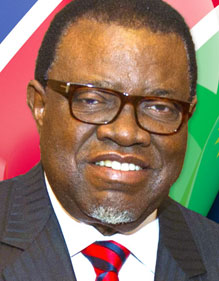
This, says Rick Messick, writing for the Global Anti-Corruption Blog, could see the country becoming a leader in the worldwide struggle to combat corruption.
Geingob’s disclosure, made on 21 May, is aimed at encouraging Namibia’s public servants to follow suit, but if other heads of state decide to do the same, writes Messick, “the country may long be remembered for its contribution to the international movement to curb corruption”.
Assets and interests should not be hidden
In 2012 Shireen Mukadam, a researcher with the Institute of Security Studies, cited former Nigerian president Goodluck Jonathan as saying “it is not the president declaring assets that will change the country”, when asked why he had not yet publicly declared his assets.
Nigeria’s Socio-Economic Rights and Accountability Project submitted a Freedom of Information request for Jonathan’s asset declarations, saying that his reluctance to do this was an indication of the government`s “lack of political will to lead by example and to combat the endemic and grand corruption which has continued to have corrosive effects on the human rights … of millions of Nigerians”.
In many parts of the world, wrote Mukadam, this issue has become key in the fight against corruption.
Geingob, who took office in March 2015, is leading conspicuously by example – on 21 April in his first state of the nation address, he made strong statements about corruption and his attitude towards such activities.
“According to Transparency International, Namibia has remained one of the least corrupt countries in the world,” he said. “It is important for public officials to take note that corruption, in any form, whether it is a kickback, commission or any other benefiting the regular execution of duty is unacceptable. Private sector should also take note that by paying a bribe, it perpetuates and entrenches the very corruption it laments.”
While Namibian law does not require the president to disclose his personal assets, said Geingob, he sees disclosure as a “key requirement in preventing undue benefits accruing to public officials.”
Managing conflicts of interests is a matter which requires political will, Geingob said, and thus he felt obliged to declare his assets in the interests of transparency and public trust. “These disclosures will be made in line with the belief that transparency starts at the top.”
To ensure an accurate result, Geingob engaged PricewaterhouseCoopers Tax and Advisory Services to independently audit his finances. Then he took pains to explain, in a statement, how he managed to build up the US$4-million net worth he reported – this took place over some 50 years as a freedom fighter, a World Bank and UN employee, and more recently an elected political leader.
The statement, commented Messick, showed that he was a “savvy investor in the Washington DC real estate market and a frugal spender”.
Good governance a focus
Good governance is one of the new president's focus areas. His PhD from Leeds University was obtained in 2004 under the theme State Formation in Namibia: Promoting Democracy and Good Governance. He is also a well-published researcher and author and an accomplished speaker. Having served twice as Namibia's prime minister, he is in a position to make informed decisions about the way forward for the country.
Geingob has started his term of office on a positive note, personally taking steps to tackle corruption. The fact that his asset disclosure was preceded by an audit by a reputable international firm and accompanied by a detailed explanation, establishes a high ethical tone for his government.
It also sets a high bar for other heads of state wanting to improve the ethical climate in their countries. We hope that other African heads of state do follow Geingob’s example, and take to heart his statement that transparency starts at the top.

